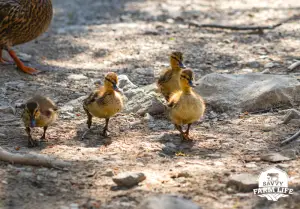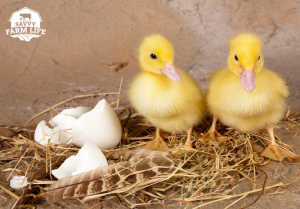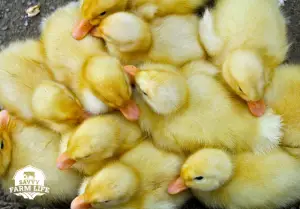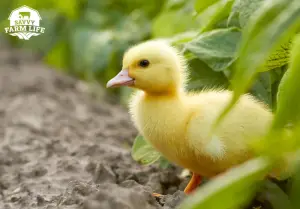What A Baby Duck Is Called
You will be hard pressed to find a cuter animal than a baby duck, with their large black eyes, tiny bills, and soft down. If you are interested in learning more about baby ducks, you will need to start with what they are called.
What is a baby duck called? A baby duck is called a “duckling”, while a group of ducklings is referred to as a “brood”. Ducklings are highly dependent on their caretaker or mother in the beginning, but only for a short time, as most breeds are considered fully grown within one to two months of life.
There is something special about watching a mother duck leading and caring for her ducklings in the Spring. Many of us have spent hours watching the ducklings trailing their mothers in the pond, lake, or backyard each year. If you are interested in learning more about baby ducks, read on for some fascinating duckling facts
Baby Duck Terminology 
We know that a baby duck is called a duckling, but what terms would you use to describe the other flock members? A mature male duck is called a drake, while a mature female is called either a hen or simply a duck. A group of ducks is called a raft, a team, or a paddling (though many refer to a group of ducks as a flock, as they would refer to a group of other avian species).
A set of ducklings may also be called a flock, but is most often referred to as a brood (and occasionally, a waddle). Female ducks lay a clutch, or a set, of up to 15 eggs before they begin to sit on them. These eggs will be laid once daily until a duck deems her clutch to be of an adequate size before settling in.
When Do Baby Ducks Hatch?
From hatcheries, ducklings are usually available throughout the year. This is because in captivity a duck can be tricked into laying with artificial lighting. If a drake is available to mate, and a duck is laying eggs, a clutch can be hatched.
In the wild things will work differently. The majority of egg-laying will occur in the early Spring through early Summer. Come Fall, production will significantly slow or stop entirely. In the wild, a duckling hatched in the colder months is at disadvantage when compared to those hatched in the warmer months. Unless there is adequate insulation, a duckling will be unlikely to survive the cold temperatures that accompany Winter in most regions. Because of the temperature challenges, almost all ducklings in the wild are hatched in the Spring and early Summer.
Baby Ducks Are Quite Advanced
Ducklings are unique in that they are able to walk, swim (theoretically), and feed themselves immediately upon hatching. The term used for this is “precocial” – meaning an animal that is hatched or born in a developmentally advanced state. This means that ducklings are fairly independent when compared to other avian species who spend weeks in the nest, relying on their mothers to fly in and feed them periodically.
How Big Are Baby Ducks?
Baby ducks will range in size, with the smallest ducklings hatching from the smallest eggs (and belonging to the smallest breeds). Likewise, the largest ducklings come from the largest eggs, and are of the largest breeds.
The Pekin duck is one of the most popular domestic breeds raised on farms and homesteads. Pekins also come in a larger variety – called “Jumbo Pekins”. Jumbo Pekins can reach up to 12 pounds at maturity, which is significantly larger than most other duck breeds. Jumbo Pekin ducklings will be much larger than those of other breeds.
Comparatively, Call ducks are one of the smallest domestic breeds – with most reaching less than 2 pounds at maturity (what they lack in size they more than make up for in chatter, however). Call ducklings will be much smaller than larger breeds like the Jumbo Pekin (or even the regular Pekin).
The Rearing Of Baby Ducks 
Some waterfowl, such as geese, pair up and mate for life, with the male playing an important role in gosling-rearing. So what about ducks – do drakes take care of the brood while Mom takes the evening off?
In short, no, male ducks do not help out in raising their young. While ducks do pair up, they usually stick together only for a season (and even then, drakes are famous for their wandering eyes). In the wild, a duck will choose a drake to partner with – after they mate, the drake will stay with the female to protect her from other male ducks. After the ducklings hatch, the drake will spend less and less time with his partner, until he leaves her entirely in the Fall to focus on his seasonal molt.
Of course, things will run a bit differently for teams of ducks in captivity. In a domesticated setting with an appropriate drake:duck ratio, the drake will mate with all of the females due to the lack of other options. The domestic drake will still instinctively protect the females, and will still ignore the ducklings.
Do Baby Ducks Quack?
Young ducklings do not quack; instead they will make a chirping or peeping sound, similar to that of young chickens. Ducks do not begin quacking until they reach approximately six weeks of age, and even then it will only be the females who participate.
The quacking sound that we are all familiar with actually only comes from female ducks. While female ducks quack, drakes emit a much softer, raspier sound. This is one of the (later) ways that you can sex young ducks.
How To Determine The Gender Of Baby Ducks
Depending on the breed, a brood of ducklings may all appear exactly alike. There are a few differences that you might be able to spot if you pay close attention, that can tell you whether your duckling is a male or a female.
Some breeds of duck may have different-colored down as ducklings, or there may be a substantial difference in size between the males and females. These external differences are the easiest ways to spot the difference between the sexes, but not every breed sports these obvious signs.
One of the most accurate methods of determining sex is also the most dangerous (to the duckling). This is called vent-sexing. The vent is the opening at the base of the tail from which the duckling eliminates waste, and procreates. Male ducks have penises, unlike the vast majority of birds today. While a male duckling will be born with a penis, it will be understandably small as well as sheathed.
To find this organ, you need to hold the duckling upside down and very gently spread the sides of the vent open to see if male genitalia pops out. If male genitalia is present, you have a male. If it isn’t, you either have a girl, or a shy boy. Vent sexing can cause significant damage to the duckling if not done properly and carefully. For this reason it is recommended that you use other methods in determining gender, or ask an experienced duck farmer or veterinarian for help.
If there are no obvious visual differences between your ducklings, and you are not familiar with vent sexing, you will need a patient ear. If you have a female duckling, she should start giving you that famous quack by around 6 weeks of age (some will start quacking as early as 3 weeks, some will be late quackers).
Can Baby Ducks Swim? 
Ducks float more than they swim, and whether or not ducklings can float largely depends on who is raising them. There are multiple factors at play that allow ducks to float in the water, and one of these is the fact that they are able to waterproof their feathers so they do not become saturated.
There is an oil gland at the base of a duck’s tail called the uropygial gland. From this gland a duck will collect oil with her bill and spread it over her feathers, “oiling” her feathers until they are waterproof.
Ducklings are born with these uropygial glands, but they are not fully functional until they are mature. For this reason, you will see mother ducks using their own oil to “preen” their ducklings, giving them a waterproofing boost. If you are raising ducklings yourself, you won’t be able to meet this need.
For this reason, it is highly recommended that ducklings in captivity are closely supervised for their early swims. Without the waterproofing that a mother duck would provide, ducklings will quickly become waterlogged. Fortunately, preening is innate to ducks, and once their uropygial gland is functioning they will begin coating their own feathers to aid in their buoyancy.
Everything (And More) That You Needed To Know About Baby Ducks
At this point you likely know more about ducklings than the average person. Ducklings are very cute, and very fun to watch – just make sure to take advantage of the time you have with them since they grow out of the baby stage so quickly. If you’re thinking of getting some ducks, you can check out more of my articles below!

